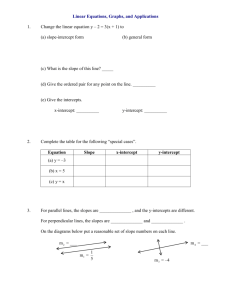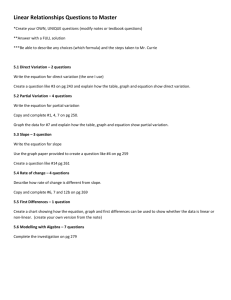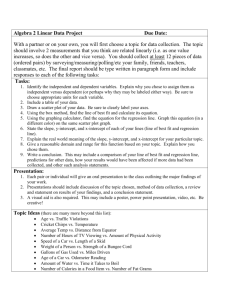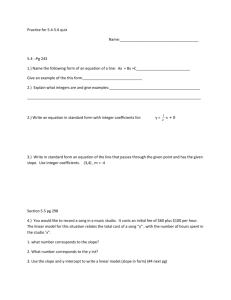Linear Equations
advertisement
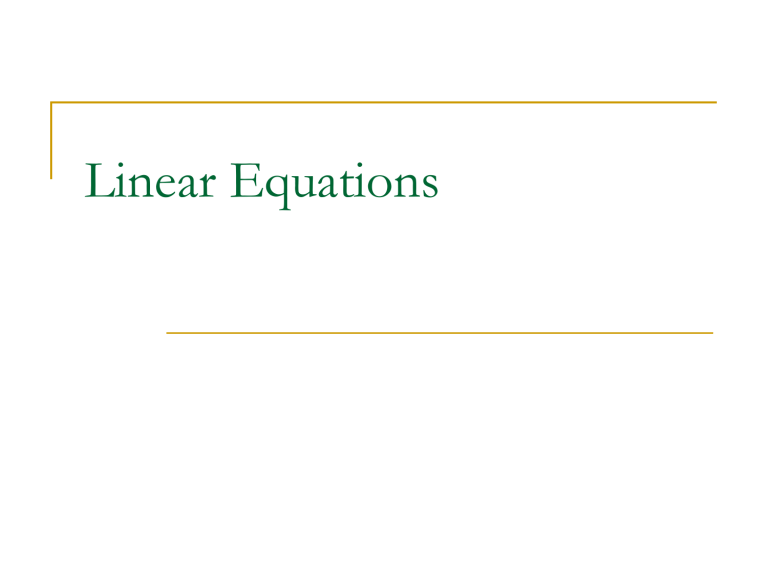
Linear Equations What makes a linear equation LINEAR? An equation in one or more variables, each with an exponent of ONLY 1, where these variables are only added or subtracted. So with that definition Which of these equations are linear? x+y = 5 2x+ 3y = 4 7x-3y = 14 y = 2x-2 3 y=4 x2 + y = 5 x=5 y xy = 5 x2 +y2 = 9 y = x2 So with that definition Which of these equations are linear? Linear x+y = 5 2x+ 3y = 4 7x-3y = 14 y = 2x-2 3 y=4 Not Linear x2 + y = 5 x=5 y xy = 5 x2 +y2 = 9 y = x2 If you had to describe a line what characteristics would you detail? y y x Line A x Line B Slope, Intercepts y y x Line A x Line B Slopes Positive Negative Horizontal Vertical Intercepts – where the line crosses ythe axes. y-intercept=4 x-intercept=-3 x x x-intercept=-5 y-intercept=-5 Line A y Line B Intercepts are actually points in the coordinate system. y y y-intercept=(0,4) x-intercept=(-3,0) x x x-intercept=(-5,0) Line A y-intercept=(0,-5) Line B Quadrants Review y II I x III VI Ordered Pairs Review : (x,y) y (-x,y) II I (x,y) x (-x,-y) III VI (x,-y) Linear Equations – What you should be able to identify for all lines. The Equation Form Direction Slope y-intercept x-intercept Parallel Slope Perpendicular Slope Equation Forms Slope Intercept Standard Horizontal Vertical y = mx + b Ax + By = C y=b x=a Slope-Intercept y = mx + b m Slope b y-intercept y=½x+5 y = -3x - 7 Standard Form Ax + By = C A, B, C are all integers with A > 0 3x – 2y = 9 4x + 2y = 16 Given our 4 example equations identify all of the following… The Equation Form Direction Slope y-intercept x-intercept Parallel Slope Perpendicular Slope y=½x+5 2. y = -3x – 7 3. 3x – 2y = 9 4. 4x + 2y = 16 1. y=½x+5 The Equation Form Direction Slope y-intercept x-intercept Parallel Slope Perpendicular Slope 1. 2. 3. 4. 5. 6. 7. Slope intercept Rising ½ 5 -5/(½) = -10 ½ -2 y = -3x – 7 The Equation Form Direction Slope y-intercept x-intercept Parallel Slope Perpendicular Slope 1. 2. 3. 4. 5. 6. 7. Slope intercept Falling -3 -7 - -7/(-3) = -7/3 -3 -7 3x – 2y = 9 The Equation Form Direction Slope y-intercept x-intercept Parallel Slope Perpendicular Slope 1. 2. 3. 4. 5. 6. 7. Standard Rising 3/2 -4.5 or 9/2 3 3/2 -2/3 4x + 2y = 16 The Equation Form Direction Slope y-intercept x-intercept Parallel Slope Perpendicular Slope 1. 2. 3. 4. 5. 6. 7. Standard Falling -2 8 4 -2 1/2 What if you are just given two points on a line? The slope formula m= y2 – y1 x2 – x1 Similar to Point-Slope Form y – y1 = m(x – x1) or y2 – y1 = m(x2 – x1) 1st – Find the Slope: y A(6,6) x B(-3,9) slope = (6 - -9) (6 - -3) = y 15 = 9 3 A(6,6) x B(-3,9) 5 slope = (6 - -9) (6 - -3) = y 15 = 9 3 A(6,6) x B(-3,9) 5 Now substitute the slope and one point into the slope intercept form y = mx + b m = 5/3 point (6,6) 6 = (5/3)(6 + b) 6 = 10 + (5/3)b -4 = (5/3)b -12/5 = b Linear equation is y = (5/3)x – 12/3 31 Linear Equations On – Line Assignment
